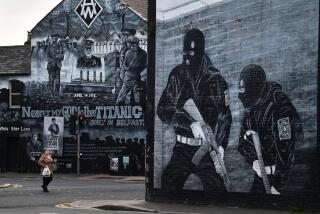Britain Needs a Diplomatic Houdini : Northern Ireland: IRA reluctance to disarm and Protestant refusal to accept less has stalled the peace talks.
- Share via
LONDON — By Trafalgar Square, named for Lord Nelson’s 1805 victory, the old Admiralty building sags as if mugged by the oppressive heat remarkable for London. Inside, behind elaborate security, is a barn of an office where a huge blue-suited Englishman of half-Irish ancestry settles himself Friday into a small armchair as he tries to explain the increasingly controversial British policy on Northern Ireland. And that’s not easy.
In his younger years, the strapping Sir Patrick Mayhew must have looked like the rugby player from hell. But now, in maturity, Great Britain’s secretary of state for Northern Ireland, is sweating, perhaps more because of the state of the Northern Ireland peace process than because of the London heat. After nearly 11 months of a negotiated ceasefire that has been a remarkable achievement of the imperiled Tory government of Prime Minister John Major, the peace process may be running out of steam. Facing a strong challenge from the Labour Party in less than 22 months, Major must produce continued economic recovery and a major political triumph or two. A permanent peace in Northern Ireland would be one Lord Nelson-sized one.
In all fairness, this government has come far closer to getting that than has any of its predecessors, but there’s a problem. “The peace process has lost momentum,” Mayhew says. “It is in a stage of arrested development.” Not a happy admission for the well-regarded Mayhew, because the British are boxed by a formulation of their own making, one driven by the need not to betray Northern Ireland Protestants fearful that Major will cut a deal with the hated Sinn Fein and the terrorist Irish Republican Army. So the British insist that the IRA begin to “decommission”--give up its weapons--before they will sit at a negotiating table with the likes of Sinn Fein President Gerry Adams.
To allow Sinn Fein or any of the fringe political parties that front for the terrorists to delay decommissioning, Mayhew argues, runs the risk of producing an agreement that will be unreliable in terms of “stickability” and that could “destroy the peace process because no [anti-Catholic, pro-union with Britain] party would show up for the talks.” Press Mayhew on this point of “decommissioning as a precondition to formal talks” and you get his mother’s Irish going. “[Protestant leader] John Hume tells everyone he’ll talk to anyone, anytime. But he has not even replied to our invitation in April, and a reminder sent in May.” And Gerry Adams, he suggests, simply suckered the Clinton Administration into granting him a visa to the United States so he could raise money, which Mayhew says is going to IRA terrorists.
“And so it’s us who come under pressure to show a bit more flexibility, imagination, courage and wisdom, to move the process forward. But I don’t move the process forward if I destroy it. And I would destroy it if I lifted that [decommissioning] requirement.”
The logic may not be shaky, but the diplomatic ground is. On this very day, not only is London’s position attacked--predictably enough--by Adams and Hume, but also by former Irish Prime Minister Albert Reynolds, who worked effectively with Major to move toward peace. Reynolds now says that decommissioning “was never a precondition in all my discussions” with Major, but has been introduced as “a belated condition to all-party talks.” And some unexpected press criticism: the prestigious weekly The Economist, which usually reflects anti-IRA British sentiment, now blasts the government’s position as a formula for stalemate.
For Mayhew, then, the heat is really on. How will he get Britain out of this box? His diplomatic escape will need to be as artful as any in the long history of British diplomacy.
More to Read
Sign up for Essential California
The most important California stories and recommendations in your inbox every morning.
You may occasionally receive promotional content from the Los Angeles Times.













